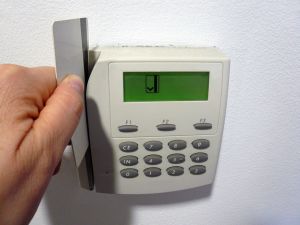Commercial Security Systems

In order to keep the business, employees and the customers safe, various commercial security systems are used. Some of the technology that is used by commercial establishments is virtually identical to that employed by homes and residential buildings. However, most businesses use a larger number of more technologically sophisticated devices which both increase physical safety and act as crime deterrence.
Some of the most common types of commercial security systems include:
Fire/smoke detectors. They are are mandatory for all public buildings and commercial establishments in the UK. All commercial establishments also must comply with the fire safety norms.
Closed-circuit television monitoring. It is found in most commercial establishments because it is highly effective deterrence from both inside and outside theft. The video surveillance system may also include movement detectors at any given location of the establishment which further reduces the risk of crime. Smaller businesses typically use systems similar to those that are used in homes and residences hoping that the sight of a video surveillance logo or/and a camera will deter criminals. Larger establishments, on the other hand, typically employ trained security guards to monitor the system and react immediately in the case of danger.
Burglary alarms. Just like burglary alarms that are used by home owners, alarms that are used by commercial establishment help prevent burglary and unauthorised access by setting off a loud or silent alarm which is typically connected with the nearest police station.
Button alarms. Since video surveillance does not always scare off the criminals and the burglar alarms are turned off when the business is open, many commercial establishments such as banks and shops are also employing button alarms which automatically alert the nearest police station that crime is attempted or taking place.

Controlled access. Commercial establishments that want to limit access to their building may use controlled access that involves passing through some kind of security checkpoint before being allowed to enter. This may involve the use of access cards which are given to the employees and checked by a security guard, digital locks, etc.
Card readers. Businesses that want to restrict access to particular areas may use card readers and give pass cards only to authorised employees. More sophisticated technology such as the use of biometrics is available to commercial establishments as well but it is currently still very expensive. For that reason it is used only by larger companies that hold very sensitive information, material or equipment. Card readers typically also allow monitoring of entries and exits.
Computer security systems. The IT technology has dramatically reduced the risk of industrial espionage and intellectual property theft by reducing the amount of sensitive information in paper files to the minimum. On the other hand, an eventual computer breach gives an authorised personnel an access to a larger number of information in comparison to breaking in a file cabinet. At the same time, it is a lot easier to steal digital information than paper files. Most commercial establishments therefore use highly sophisticated computer security systems.